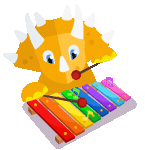What Great Thinkers Say About Learning New Languages
Why should children learn another language? Is it really that important in today’s world? To help answer that question, we can turn to a few words of wisdom—funny, smart, and inspiring—from well-known people who understood the power of language.
Language Is More Than Just Words
Gordie Howe, the famous hockey player, once joked, “All hockey players are bilingual. They know English and profanity.” While humorous, this reminds us that language is tied to culture, emotion, and even identity. Language isn’t just something we learn—it’s something we live.
Similarly, actor Gates McFadden said, “Just learning to think in another language allows you to see your own culture in a better viewpoint.” When children learn a second language, they begin to see the world through a broader lens, developing empathy and awareness beyond their own experiences.
Being Bilingual Brings Real-Life Benefits
Benjamin Franklin playfully criticized someone who “could name a horse in nine languages” but still “bought a cow to ride on.” This witty remark shows that language learning is most valuable when it’s paired with understanding and real-life use.
That’s why bilingual children tend to do better in school, develop stronger problem-solving skills, and grow up with better communication habits. As linguist Dr. Pierina Beckman explains, “Most children will learn a foreign language well up to age 12. After that, the brain works differently.” Early childhood is a golden time for acquiring languages naturally.
Bilingualism Is for Everyone
From politicians to actors, many people speak about the value of being bilingual. Roselyn Sanchez once said, “I’m perfectly bilingual, but I’m never going to sound like Sandra Bullock.” Her words highlight the idea that bilingualism doesn’t mean being perfect—it means being flexible, functional, and expressive in more than one language.
Whether you’re a hockey player, a teacher, or a child learning to say your first “hello” in French, language is a tool for connection. Myriam Siftar notes that you might “converse pretty well in English, but not feel comfortable reading an email.” That’s why comprehensive language learning—listening, speaking, reading, and writing—is so important.
Helping Your Child Become Bilingual
Want your child to develop strong bilingual skills while having fun? Dinolingo offers an award-winning platform for kids aged 2 to 14. With access on web, iOS, and Android, children can explore more than 50 languages through games, videos, songs, flashcards, and stories. One subscription includes six users, offline materials, and a parent dashboard to track progress—perfect for families who want to grow and learn together.
Final Thoughts
Being bilingual is not just about knowing two sets of words—it’s about understanding the world in two different ways. Whether it’s for academic success, cultural connection, or future opportunities, language learning opens doors.
So let’s listen to the voices of those who know—authors, educators, entertainers—and give children the tools to think, dream, and laugh in more than one language.
Start Learning a New Language Today!
Best Language App for Kids.
7-day free trial. Then only $19/month. Cancel anytime.
